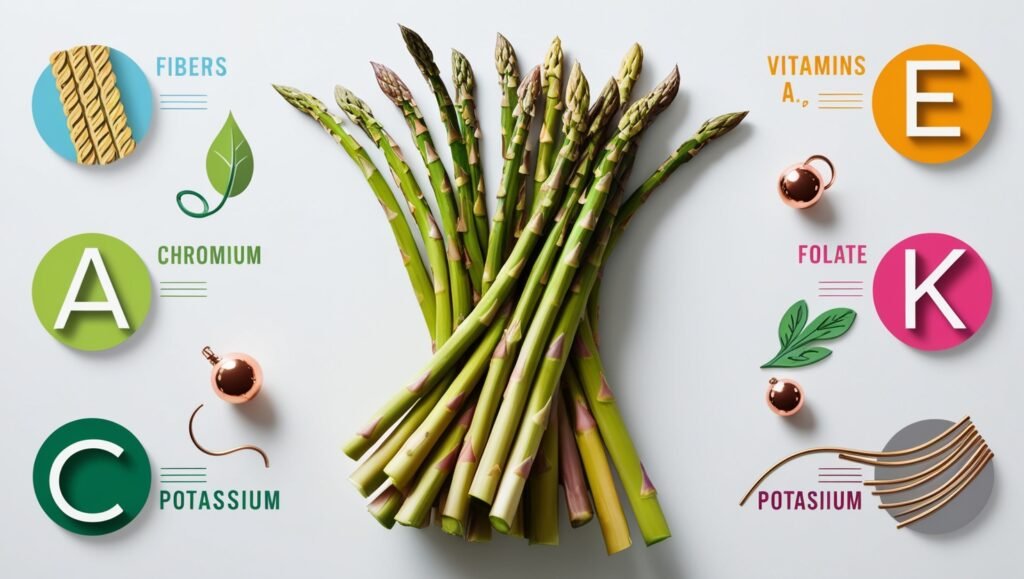Asparagus, often celebrated for its unique flavor and vibrant green spears, is not just a gourmet delicacy but a powerful healing food. Rich in nutrients and beneficial compounds, asparagus offers numerous health benefits that make it an essential addition to a balanced diet. This comprehensive guide explores the healing properties of asparagus, its nutritional profile, and how you can incorporate it into your daily routine for optimal health benefits.

Nutritional Profile of Asparagus
Asparagus is packed with essential vitamins and minerals that contribute to its status as a healing food. Here are some key nutrients found in asparagus:
Fiber: Supports digestive health and regular bowel movements.
Vitamins A, C, E, and K: Powerful antioxidants that support immune function, skin health, and blood clotting.
Folate: Vital for DNA synthesis and repair, and crucial during pregnancy.
Chromium: Enhances insulin’s ability to transport glucose from the bloodstream into cells.
Potassium: Helps regulate blood pressure and maintain heart health.
1. Rich in Antioxidants
Asparagus is loaded with antioxidants, including vitamin C, vitamin E, and various flavonoids and polyphenols. These compounds help combat oxidative stress by neutralizing free radicals, reducing inflammation, and protecting cells from damage. This makes asparagus a potent healing food that can help prevent chronic diseases.
2. Supports Digestive Health
Asparagus is an excellent source of dietary fiber, which is essential for maintaining a healthy digestive system. Fiber adds bulk to the stool, aiding in regular bowel movements and preventing constipation. Moreover, asparagus contains a unique type of fiber called inulin, which acts as a prebiotic. Inulin promotes the growth of beneficial bacteria in the gut, supporting overall digestive health.
3. Promotes Heart Health
Asparagus is beneficial for heart health due to its high levels of potassium and low sodium content. Potassium helps regulate blood pressure by balancing the effects of sodium in the body. Additionally, the fiber in asparagus helps lower cholesterol levels, further reducing the risk of heart disease. The antioxidants in asparagus also protect the heart by reducing inflammation and preventing oxidative stress.
4. Enhances Brain Function
The folate content in asparagus plays a crucial role in brain health. Folate works together with vitamin B12 to prevent cognitive decline and maintain cognitive function. Asparagus also contains compounds that support brain health by protecting neurons from damage and improving neurotransmitter function. Regular consumption of asparagus can help enhance memory and cognitive performance.
5. Anti-Inflammatory Properties
Chronic inflammation is a significant contributor to many serious diseases, including heart disease, cancer, and diabetes. Asparagus has potent anti-inflammatory properties due to its high antioxidant content. These antioxidants help neutralize free radicals and reduce inflammation in the body, making asparagus a powerful healing food.
6. Supports Bone Health
Asparagus is rich in vitamin K, which is essential for bone health. Vitamin K plays a crucial role in bone formation and helps maintain bone density by assisting in the regulation of calcium in the bones and blood. Additionally, the presence of vitamin C in asparagus aids in collagen production, which is vital for maintaining the structural integrity of bones and joints.
7. Boosts Immune System
The high vitamin C content in asparagus helps boost the immune system by stimulating the production of white blood cells, which are essential for fighting off infections. Additionally, the antioxidants in asparagus protect immune cells from oxidative stress, enhancing their function. Regular consumption of asparagus can help strengthen your immune system and improve overall health.
8. Regulates Blood Sugar Levels
Asparagus has a low glycemic index, meaning it does not cause a rapid spike in blood sugar levels. The fiber content in asparagus helps regulate blood sugar by slowing the absorption of glucose into the bloodstream. This makes asparagus a suitable food for individuals looking to manage their blood sugar levels and reduce the risk of diabetes.
9. Promotes Healthy Pregnancy
Asparagus is an excellent source of folate, a B-vitamin that is crucial for pregnant women. Folate helps in the formation of red blood cells and the development of the neural tube in fetuses, reducing the risk of birth defects. Adequate folate intake during pregnancy is essential for the healthy development of the baby and the prevention of complications.
10. Detoxifies the Body
Asparagus is a natural diuretic, meaning it helps increase urine production and flushes out excess salt and fluids from the body. This detoxifying effect helps cleanse the kidneys and bladder, reducing the risk of urinary tract infections. Additionally, the high antioxidant content in asparagus supports the liver in detoxifying the body by neutralizing harmful toxins.

How to Incorporate Asparagus into Your Diet
Incorporating asparagus into your diet is simple and can be done in various delicious ways. Here are some ideas on how to enjoy this healing food:
Grilled Asparagus: Toss asparagus spears with olive oil, salt, and pepper, and grill until tender. Serve as a side dish or add to salads.
Asparagus Soup: Blend cooked asparagus with vegetable broth, garlic, and onions to make a creamy and nutritious soup.
Roasted Asparagus: Roast asparagus spears in the oven with a drizzle of balsamic vinegar and a sprinkle of Parmesan cheese.
Asparagus Stir-Fry: Sauté asparagus with your favorite vegetables and protein for a quick and healthy stir-fry.
Asparagus Frittata: Add chopped asparagus to your egg mixture for a delicious and nutritious frittata.

Frequently Asked Questions (FAQ)
Q: How much asparagus should I eat daily for health benefits?
A: It is recommended to consume about 1 to 2 cups of asparagus per day to reap the maximum health benefits. Asparagus is low in calories and can be included in various meals throughout the day.
Q: Is asparagus suitable for people with diabetes?
A: Yes, asparagus is suitable for people with diabetes. It has a low glycemic index and high fiber content, which helps regulate blood sugar levels and improve insulin sensitivity.
Q: Can asparagus help with weight loss?
A: Yes, asparagus can be part of a weight loss diet. It is low in calories, high in fiber, and contains compounds that help reduce appetite and increase feelings of fullness.
Q: Are there any side effects of eating asparagus?
A: While asparagus is generally safe to consume, some people may experience an unusual odor in their urine after eating it. This is due to the breakdown of asparagusic acid and is harmless. Additionally, people with allergies to asparagus should avoid it.
Q: What is the difference between green and white asparagus?
A: The primary difference between green and white asparagus is the way they are grown. Green asparagus is grown above ground and exposed to sunlight, while white asparagus is grown underground and covered with soil to prevent chlorophyll production. White asparagus tends to have a milder flavor and more delicate texture compared to green asparagus.
Q: Can asparagus improve skin health?
A: Yes, the vitamins and antioxidants in asparagus can help improve skin health. Vitamin C aids in collagen production, while vitamin E protects the skin from oxidative damage. These nutrients help maintain healthy, youthful skin.
Q: How should I store asparagus to keep it fresh?
A: To keep asparagus fresh, store it in the refrigerator with the stems in a cup of water, similar to how you would store cut flowers. You can also wrap the stems in a damp paper towel and place the asparagus in a plastic bag.
Q: Is asparagus safe to eat during pregnancy?
A: Yes, asparagus is safe and highly beneficial to eat during pregnancy. It is an excellent source of folate, which is essential for the healthy development of the fetus and reducing the risk of birth defects.
Q: Can asparagus be eaten raw?
A: Yes, asparagus can be eaten raw, although it is typically cooked. Raw asparagus can be added to salads or enjoyed as a crunchy snack with dip.
Q: What are some ways to prepare asparagus for picky eaters?
A: For picky eaters, try roasting asparagus with a bit of olive oil, salt, and garlic, or adding it to dishes like pasta, omelets, or casseroles where the flavor blends with other ingredients.
Conclusion
Asparagus is a versatile and nutritious healing food that offers a multitude of health benefits. From supporting digestive and heart health to boosting the immune system and enhancing brain function, its rich nutrient profile makes it a valuable addition to any diet. By incorporating asparagus into your meals in various delicious ways, you can enjoy its healing properties and improve your overall well-being. So, the next time you’re looking for a healthy addition to your plate, reach for some asparagus and savor the numerous benefits it has to offer.



